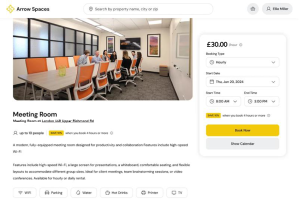Bandwidth Could Be The Differentiator For Flexible Space Operators Post-COVID
We are going to return to the office one day. But the way we work will have changed and, as a result, the office might not be ready to handle us. Zoom, Teams and other online meeting platforms will put more pressure on IT infrastructure than ever before.
“I absolutely think people will go back to the office as soon as their business and the environment permits,” Yardi Regional Director Justin Harley said. “However, people will bring along a new work ethos from working from home. Employees are far more familiar with videoconference calls and are far more willing and accepting to switch on the webcam. So the demand on data has gone up and operators must prepare.”
Do You Have The Bandwidth?
Openreach reported that broadband usage across its network more than doubled in 2020. During the first UK-wide lockdown in March 2020, the company saw a 30% increase in daytime broadband use compared to before the global pandemic, mainly due to working from home and home-schooling.
The UK is now amidst the third nationwide lockdown and people have become more used to working from home. Video calling is second nature to many, for example, and Harley believed that is unlikely to change even when workers return to the office. Demand on bandwidth post-COVID and the migration to working from the office again will have a significant demand on flexible space IT infrastructure.
According to Yardi, a Zoom audio call consumes under 100 KB per second, which is similar to a VoIP audio call. A one-on-one Zoom video call consumes anywhere between 600 KB to 1.8 million MB per second depending on quality — a six to 18 times increase. A group video call takes this from 1 million to 3 million MB per second — a 10 to 30 times increase. If an office has ageing hardware that can’t handle these speeds, customers won’t be happy.
“The return to offices will impact the demand on wifi infrastructure as well as base data needs,” Harley said. “The WiFi will need to be of a standard to be able to provide reliable demand on data. Core infrastructure will need to be of a standard to support these high-capacity internet circuits, as well as more concurrent sessions as a result of the dramatic move to cloud computing and interactions.”
For operators that generated income by operating voice services, this will be a blow. The opportunity for flexible space providers now could be to provide more flexible guaranteed bandwidth plans for customers.

Yardi IT Across The Board
Bandwidth aside, Harley believes that operators need to ensure they are meeting top IT standards generally. Take meeting spaces, for example. Harley predicted that the use of meeting rooms will go up as teams are “chomping at the bit” to interact in person again, to brainstorm. An operator needs to have an efficient way to manage such spaces.
“Businesses are going to have to be more stringent about booking space in order to deploy a proper cleaning regime after a space has been used,” Harley said. “Operators need to think of meeting rooms as contactless, such as booking and opening the door with a phone. If you don’t allow people to book through an app you’re missing a trick. If in your marketing and offering you say you’re high-tech, make sure you are.”
A business should make sure it is getting the best out of apps in general, Harley said, both in terms of offering services to customers and managing back-end functions. Yardi reported a leap in customers using its apps to manage spaces since the pandemic arrived, as businesses saw the need for immediate, easy-to-deploy solutions to enable the switch to a contactless world.
Harley acknowledged that operators might find it hard to look beyond immediate pressures to assess IT right now. The struggles facing the sector are clear. IWG is moving to take control of Argyll Club, which went into administration in December. MSO Workspace, which operated offices in cities such as Birmingham, Manchester and Northampton, is also in administration. In the U.S., Serendipity Labs is in the middle of Chapter 11 bankruptcy proceedings.
However, Harley said that the outlook will improve for the sector soon. A recent survey by JLL found that three-quarters of workers want to return to the office. For serviced office providers, this is good news. JLL’s survey also highlighted that while 71% of workers want more flexible schedules, 57% want more choice of workspaces and 43% want the option to work from a coworking facility at times.
“It’s a tough time for the flex space sector; there’s never been a time when it’s been so tough,” he said. “If operators can hang in there, the outlook is positive. If they can think of the basic tech things to improve in order to get the space ready, they’ll be in a good place when people come back.”




